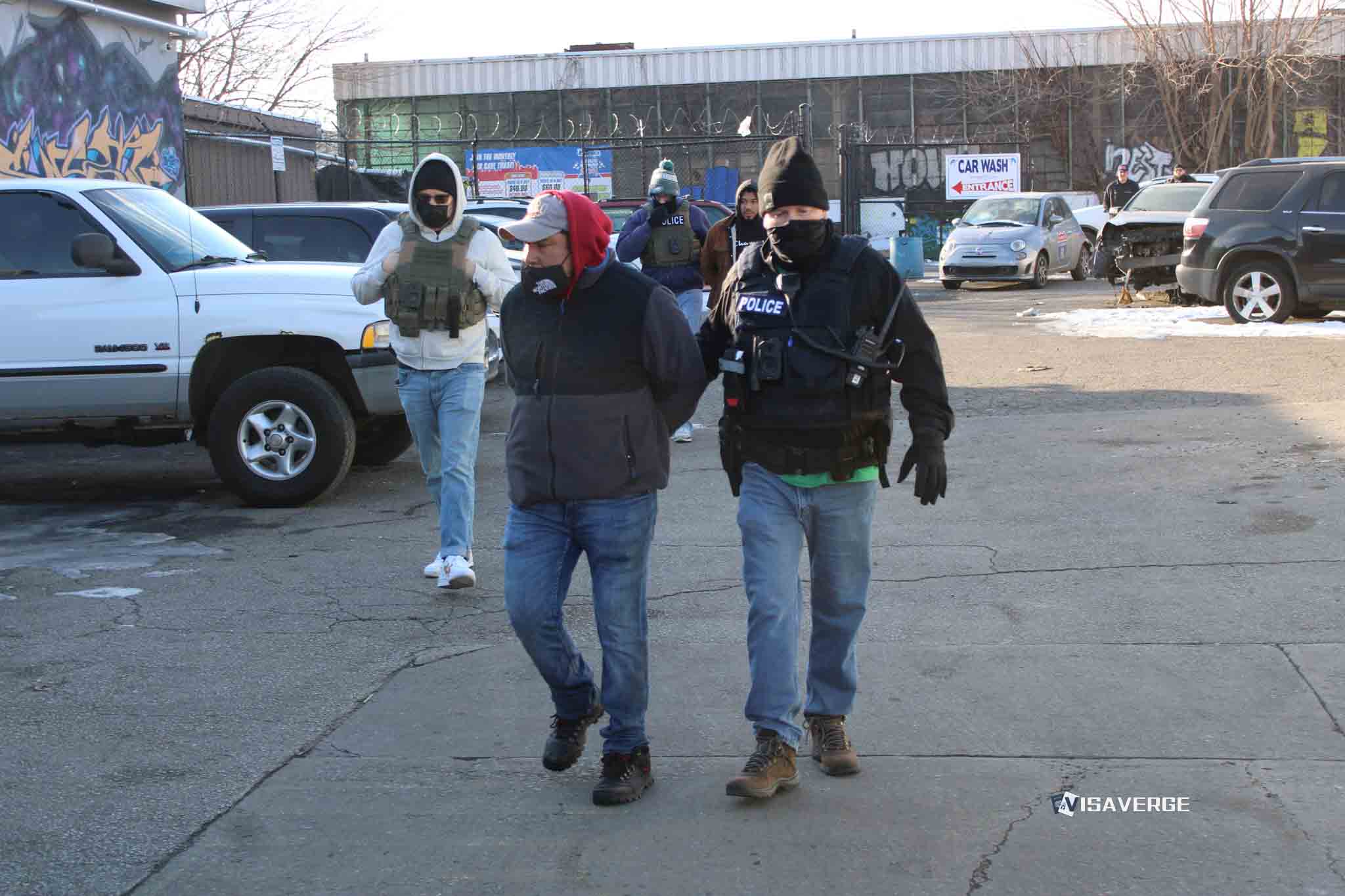Congressman Raja Krishnamoorthi is pressing the Biden administration for answers after learning that the Department of Homeland Security may rely on private firms to help Immigration and Customs Enforcement track immigrants inside the United States, raising fresh alarms about profit‑driven surveillance and civil rights. In a sharply worded letter to DHS Secretary Kristi Noem, the Illinois Democrat said he has “grave concern” about reported plans to outsource core immigration enforcement tasks to private contractors who would be paid to locate, monitor, and report on non‑citizens.
Questions about legal authority and public oversight

The letter, shared with colleagues on Capitol Hill, asks DHS to explain exactly what authority it believes allows it to hand key policing functions to private actors. Krishnamoorthi argues that turning over surveillance and enforcement powers to outside companies could create a parallel immigration system that operates in the shadows, away from normal public oversight.
“When the power to investigate, track, and detain people is put in the hands of entities that answer first to shareholders, the risk of abuse grows,” he wrote, warning that secrecy and corruption can flourish when money becomes the main driver.
Concerns about profit motives and incentives
At the center of his concern is the idea that private contractors, motivated by profit and performance bonuses, could be rewarded for flagging more immigrants as “targets,” regardless of the strength of evidence or the impact on families and communities.
- Krishnamoorthi’s intervention signals a shift from focusing solely on surveillance technology to scrutinizing the companies that run it.
- According to analysis by VisaVerge.com, lawmakers from both parties have previously raised alarms about the rapid growth of commercial surveillance tools in immigration enforcement, including:
- automatic license plate readers,
- facial recognition systems,
- massive data‑mining contracts.
Data access and retention: specific questions posed
In his letter, the congressman asks DHS to spell out what kinds of data private firms would be allowed to access under the reported plans. He requests details on whether contractors could reach:
| Type of data | Why it matters |
|---|---|
| Driver’s license databases | Identity verification and location correlation |
| Utility records | Confirming residence or occupancy patterns |
| Commercial data brokers | Aggregated profiles from multiple sources |
| Social media information | Behavioral or association clues |
| Location data from phones and vehicles | Real‑time or historical tracking |
He also asks DHS to describe:
- What limits, if any, would exist on how long private contractors can store that information.
- Whether contractors can sell or reuse the data for other clients.
For immigrant communities already wary of government monitoring, the idea that commercial players could be piecing together their lives from scattered data points adds another layer of fear.
Risks of errors and past wrongful detentions
Krishnamoorthi ties his objections to a broader history of wrongful arrests and detentions that have followed flawed or biased enforcement tactics. He cites prior cases in which U.S. citizens and legal residents were swept up in ICE operations because of:
- mistaken identity,
- bad data,
- racial profiling.
He argues that giving more power to outside companies could magnify those errors. Specific risks he outlines include:
- An algorithm misidentifies someone as a target.
- A field investigator cuts corners to meet a quota.
- Resulting harms: parents taken from children, workers detained on their way to a job.
Transparency problems and the “black box” of private contractors
The congressman’s office has already clashed with immigration authorities over transparency. He points to earlier efforts to conduct oversight of an ICE facility in Broadview, Illinois, when officials allegedly refused him entry despite his role in congressional oversight.
- That episode, he argues, shows how hard it can be for even elected representatives to see what is happening inside the immigration system.
- Adding private contractors, he says, makes the “black box” even darker because corporate secrecy rules and non‑disclosure agreements can block public access to information.
Focus on Flock Group Inc. and similar firms
Krishnamoorthi highlights his staff’s inquiries into the work of Flock Group Inc., a private surveillance company known for automatic license plate readers that capture millions of vehicle scans.
- Reports have linked Flock’s systems to investigations by ICE and other law enforcement bodies.
- This raises questions about how far data from local neighborhoods can travel into federal immigration cases.
For many advocates, the partnership between government agencies and such private firms shows how surveillance built for traffic safety or crime prevention can quietly feed immigration enforcement, often without clear notice to the public.
Requested safeguards and accountability measures
In the letter, the congressman urges DHS to detail what safeguards it will put in place to prevent harassment, intimidation, or unlawful actions by private contractors acting in ICE’s name. He asks whether there will be:
- strict training on civil rights,
- clear rules on the use of force,
- strong penalties for misconduct.
He also requests clarification on remedies available to people harmed by contractors, including whether they can:
- sue the companies directly,
- file complaints,
- demand correction of bad data.
Without such protections, he argues, people harmed by mistakes or bias may have nowhere to turn.
Broader civil‑rights and governance concerns
Civil rights groups have long warned that outsourcing public functions to private entities can weaken accountability because the companies are not elected and often shield internal documents from disclosure. Krishnamoorthi echoes those concerns, stressing that immigration enforcement touches:
- personal liberty,
- family unity,
- often life‑or‑death asylum claims.
He insists any move to expand the role of private firms should be debated openly in Congress, not quietly pushed through contract changes or pilot programs. DHS, he demands, must provide documents describing:
- its legal analysis,
- internal guidelines,
- any pilot projects that rely on private surveillance teams.
A question of public control versus corporate power
The congressman frames the issue as one that goes beyond immigration policy and strikes at basic ideas about government power. In his view:
- The decision to detain or deport someone should remain firmly under public control, with officers who answer to elected leaders and courts — not to corporate boards.
- Allowing private contractors to build and run large‑scale surveillance systems risks “eroding public trust and American values,” especially in mixed‑status communities where citizens and non‑citizens live side by side.
He warns that if neighbors come to believe every camera, scanner, or database could feed into an immigration dragnet, cooperation with law enforcement on other issues could fall sharply.
DHS response and available information
While DHS has not publicly laid out a detailed response to his letter, the department has previously defended its use of technology and partnerships as necessary tools for public safety and border control. The agency says it operates under federal privacy laws and internal guidelines that limit how information is collected and used.
Official material about DHS enforcement and oversight structures is available on the U.S. Department of Homeland Security website. Krishnamoorthi, however, argues that existing safeguards were designed for a system in which the government itself runs operations, not one where private companies hold vast data troves and carry out front‑line surveillance.
Impact on immigrant communities and daily life
For immigrants — especially those with pending cases or mixed‑status families — the debate can feel abstract until an officer or a contractor’s employee shows up at a workplace, school, or home. Advocates say:
- When enforcement relies more heavily on digital monitoring supplied by private firms, people may have little warning that they are being watched until it is too late.
- Krishnamoorthi’s push for clarity is not just about high‑level policy but about the daily sense of safety in communities where a single knock on the door can change everything.
This Article in a Nutshell
Rep. Raja Krishnamoorthi is pressing DHS for details after reports that private contractors might perform ICE tracking and surveillance. He warns that profit incentives could drive overreach, errors, and weakened accountability, citing Flock Group Inc. and past wrongful detentions. His letter demands legal justification, lists of accessible data sources, retention and reuse rules, and safeguards including civil-rights training, penalties, and remedies. He calls for congressional debate and transparency before expanding private involvement in immigration enforcement.













